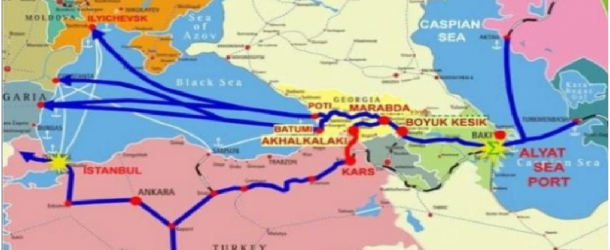The 44-Day Patriotic War of Azerbaijan against Armenia’s occupation did not only ensure justice and the demands of international law, but also paved the way for cooperation at the international level, enabling the construction of transportation-communication networks that will cover a worldwide geography.
Despite the occupation policy of Armenia for nearly thirty years, Azerbaijan was persistently and resolutely realizing its international transportation-communication projects. In line with its rights arising from international law Azerbaijan’s termination of the Armenia’s occupation and forcing Armenia to sign the capitulation act on November 10, 2020, completely paved the way for our region to be turned into a global transportation-communication hub.
This process is extremely important for the completion and globally acceptance of the Middle Corridor (Trans-Caspian International Transport Route-TITR), which has been taking shape for a long time. The Government of the Republic of Azerbaijan has been resolutely crafting the legal basis of the Middle Corridor by international agreements for years. In this direction, the technical and construction processes are mainly completed and some other issues are about to be completed.
In this context, two important developments took place in March, 2022: 1-) Memorandum of Understanding between the Republic of Azerbaijan and the Islamic Republic of Iran, 2-) Signing of quadripartite declaration between Georgia, Azerbaijan, Turkey, and Kazakhstan on the Trans-Caspian East-West Corridor. These two important legal documents are of utmost importance in terms of reinforcing the legal basis of the Middle Corridor. Its importance is also due to the diversification of routes within the Middle Corridor. Deputy Prime Minister of Azerbaijan Mr. Shahin Mustafayev and Minister of Roads and Urban Development of the Islamic Republic of Iran Mr. Rustam Gasimi signed a Memorandum of Understanding in Baku on March 11 to establish new communication links via Iran between the East Zangazur Economic Region and the Nakhchivan Autonomous Republic of the Republic of Azerbaijan.
The corridor will consist of a railway connecting between East Zangazur and Nakhchivan, a multi-lane highway, power transmission lines, digital communications and other elements, passing 5 km south of the Iranian-Armenian border. This initiative can be considered as part of Azerbaijan’s strategy of diversifying routes within the Middle Corridor.
As it is known, one of the commitments undertaken by Armenia in the agreements of November 10, 2020, January 11, 2021 and November 26, 2021 is to enable Azerbaijan to reach the Nakhchivan Autonomous Republic via the land transportation- Zangazur Corridor.
However, Armenia has not fulfilled its obligations and started to use the Zangazur Corridor as a “trump card” until today. Because they have thought that the monopoly of transportation route belongs to Armenia itself. With this step, Azerbaijan proved that Armenia does not have any “monopoly”. This should not mean that the Armenia’s Zangazur Corridor obligation is not on Azerbaijan’s agenda.
The main strategy of Azerbaijan is diversification. By isolating itself from regional integration, Armenia remains excluded from major economic developments and financial revenues. As another important development, on March 30, 2022 Georgia, Azerbaijan, Turkey, and Kazakhstan have signed a quadripartite declaration on the Trans-Caspian East-West Corridor. The Declaration emphasizes the importance of the East-West Corridor and strengthens the potential of the four countries to integrate into the international transport system.
The declaration also notes the important role of the Baku-Tbilisi-Kars railway in promoting competitive transport between Europe and Asia, and emphasizes the importance of completing construction work to increase the capacity of the railway. The document also notes the importance of investment in infrastructure to improve the quality of transport operations on this route.
It is observed that the supplier and buyer countries between the West and the East turn to the Middle Corridor countries in terms of both energy resources and transportation-communication lines. We can list the reasons for this as follows:
1-) Transportation with the Middle Corridor is more preferable in terms of both time and cost;
2-) Saving the goods and services from the international sanctions applied to Russia.
Considering all these, it is very important that Azerbaijan, which is a natural gas and oil producer, also turns to an important hub country in the international transportation-communication route.
Dr. Elsevar SALMANOV
First Secretary of Embassy of the Republic of Azerbaijan to Malaysia

























































